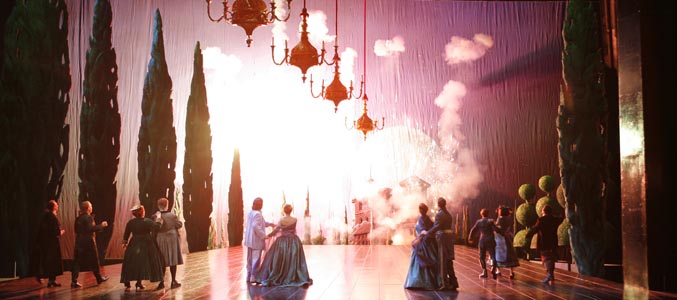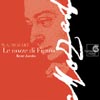| Los
Angeles Opera's revival of its 2004 production once again proved
to be worthy of Mozart's universally acknowledged masterpiece
of music-theater, thanks to Maestro Kent Nagano's as-always
superb musical direction that brought out the best from the
orchestra and the outstanding cast. And there was no mistaking
it - everyone, onstage and off, had a lot of fun!
Mozart's version of "Upstairs,
Downstairs," Le Nozze di Figaro has got to be
the most enjoyable musical articulation of the human foibles
expressed, in Mozart's time and ours, as sexual indiscretions.
The opera, with libretto by the defrocked Abbe Lorenzo Da Ponte,
is a riotous comedy of class and sexual tensions that happily
resolve themselves in the end.
Yes, it's all about sex and a
bit of class politics, circa 18th century Europe. And
it took the genius of a Mozart to seamlessly weave music
and text into the unified work that has come to be hailed by
many as perhaps the greatest opera in the world. The story,
extracted from playwright Pierre Augustin-Caron de Beaumarchais'
then scandalous comedy, is an intricate web of amorous subplots
and confused subterfuges, peppered with politically subversive
undertones that allowed Mozart to poke fun at the ruling classes
and their one-sided legal system.
Figaro is of course the same
Figaro, the erstwhile "Barber of Seville," who connived
with a younger Count Almaviva in his efforts to win Rosina from
her guardian Dr. Bartolo. Figaro becomes the Count's manservant.
Years pass, the Count's love for Rosina, now the Countess, has
cooled off. At the moment he lusts for Figaro's betrothed, the
Countess' maid Susanna, determined to have her on her wedding
night - claimant to his conveniently reinstated right as lord
of the manor! The plot thickens as Figaro, now aware of his
master's intent, schemes to beat the nobel Count at his game.
As the scenes excerpted below show, there is never a dull moment,
and unless one goes to the opera looking for imperfections,
there is everything to like about this production.
Photos: ©Robert Millard, courtesy of Los Angeles Opera |
From the moment one heard the first measures of the familiar overture,
delivered robustly and with impeccable polish, one knew this was
going to be a very special Mozart evening. True, director Ian
Judge did not precisely place the story, which takes place in
the space of one day, in historical time. Between bedroom telephones
and flashlights glowing in the dark and period britches and elegant
summer suits, the time swings from 18th century to contemporary
and back were almost as frequent as Cherubino's self-confessed
mood swings. But we found these external incongruities to be neither
bothersome nor distracting. Indeed, in an opera buffa
such as Figaro they were more than tolerable, they were
very much part of the fun. And perhaps Judge meant to tell us
this: that the internal actions in Figaro that take place
in the hearts and minds of the characters are for any time and
any place. The cast
without exception sang in excellent voice, inhabiting the characters
with an innate flair for the comic. Soprano Barbara Bonney,
winsome in her company debut as Susanna, around whose predicament
the plot revolved, was radiant in voice and demeanor.
She revealed herself to be a natural comedienne; it is no wonder
she has owned the soubrette role for years.
The young Russian bass Ildar
Abdrazakov was a handsomely suave and stalwart Figaro with a
voice to match. It is a role he has obviously grown into since
his debut at the famed Marinsky Theatre, and it predictably
will be one of the signature roles of his rising career.
Baritone David Pittsinger was
solid and convincing as the unstoppable, jealous Count and Canadian
soprano Adrianne Pieczonka was stately and sympathetic as the
despondent Countess as she was as the Marschallin (in LA Opera's
Der Rosenkavalier of an earlier season) - was
she born to sing the role of the lovelorn noblewoman?
The rambunctious Cherubino found
a perfect match in mezzo-soprano Lucy Schaufer - she was a riot
and the evening's delight.
In Figaro, Mozart gave
his minor characters more than a token piece of the stage
and the music. But specially in this production, it was impossible
not to have been singularly amused by Anna Steiger's charmingly
comic and well-sung Marcellina. Greg Fedderly as Don Basilio,
Michael Gallup as Dr. Bartolo, and Jessica Swink as Barbarina
all spiced up the evening's hilarity.
The curtain fell as the last
sparks from the real-life fireworks that celebrated the Marriage
of Figaro faded into the night. The fireworks were the
one spectacle of Tim Goodchild's lean but imaginative stage
sets. But this "Figaro" did not need any more. Under
Maestro Kent Nagano's baton, which he wielded for the last time
as the company's Music Director, the music itself was the spectacle
- with its many arias, duets, sextets, etc. that are the most
tuneful in all of opera. Nagano's farewell performance
(he leaves for his new posts in Munich and Montreal) was a fitting
and magnificent celebration of Mozart's 250th anniversary. The
audience that enjoyed "Figaro" went home with the
certain knowledge of what great opera, indeed what great music
is (in the words of another great conductor, Sir Thomas Beecham)
- played here by an orchestra that has attained international
stature under Nagano's leaderhip: "that which penetrates
the ear with facility and quits the memory with difficulty." |


